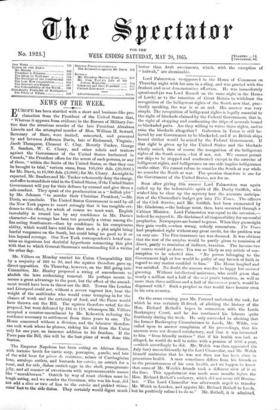Lord Palmerston re-appeared in the House of Commons on Thursday
night with his arm in a sling, and was greeted with the freshest and most demonstrative affection. He was immediately questioned (as was Lord Russell on the same night in the House of Lords) as to the intention of Great Britain to withdraw the recognition of the belligerent rights of the South now that, prac- tically speaking, the war is at an end. His answer was very simple. The recognition of belligexent rights is legally essential to the right of blockade claimed by the Federal Government, that is, the right of stopping and confiscating the ships of neutrals bound to blockaded ports. Are they willing to waive these rights, and to raise the blockade altogether? Galveston in Texas is still be- lieved by our Government to be blockaded, and if so British ships bound thither would be seized by the Federal Government. If that right is given up by the United States and the blockade wholly raised, then of course the recognition of the belligerent rights of the South ceases,—but if not, not. We cannot permit our ships to be stopped and confiscated except in the exercise of belligerent rights, and belligerence on one side implies belligerence onthe other. We cannot refuse to consider the South at war while we consider the North at war. The question therefore is one for the Government of the United States, not for us.






























